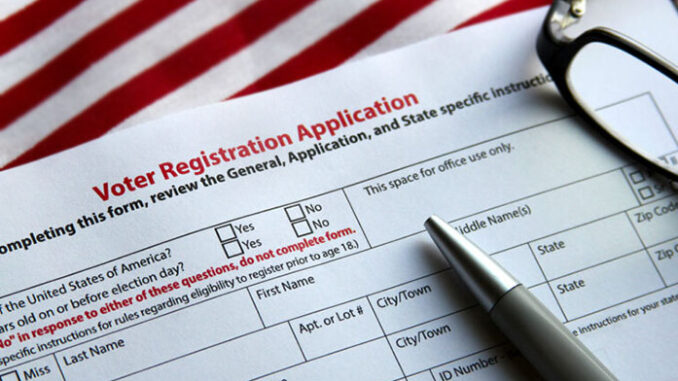
Two new Arizona election laws on hold since last September due to a federal court order could finally go into effect this year, as the U.S. Court of Appeals – Ninth Circuit plans to hear arguments in the case on May 16.
And the hearing could not be timelier, as questions are being raised across the state about the policies used by the 15 county recorders to cancel the registration of various voters, possibly without the voters being informed of the cancellation until they show up to vote.
The oral arguments in the case of Arizona Alliance for Retired Americans vs. then-Arizona Secretary of State Katie Hobbs and all the county recorders involves Senate Bill 1260 (2022), which was signed into law by Gov. Doug Ducey in June 2022. Hobbs has been replaced in the lawsuit by Adrian Fontes, the new Secretary of State.
Various provisions of SB1260 took effect last September, but a federal judge in Phoenix issued a preliminary injunction barring implementation of two provisions. One provision makes it a felony in some situations to enable someone else to vote.
The other provision involves situations in which a county recorder receives information that a voter may also be registered in another jurisdiction. The language of that second provision is unclear what effort a county recorder must make before cancelling a voter’s registration based on the possibility the voter is also registered somewhere else.
There are even questions about what notice, if any, needs to be provided to the impacted voter.
All of which is attracting renewed attention after nine counties released public records to attorneys for Arizona Attorney General candidate Abe Hamadeh showing hundreds of voters who cast ballots in those counties in 2018 and 2020 were cancelled, or dropped, prior to the 2022 General Election.
Some of those voters told Arizona Daily Independent last week they never moved from their main residence nor registered to vote in another county. Most had, however, had filled out a temporary mail forwarding notice, paid property taxes in more than one county, or registered a vehicle to an address outside their primary county.
Consistently, the voters reported never being told they ended up being registered in another county and thus cancelled in their primary county.
The National Voter Registration Act of 1993 (NVRA) sets forth certain voter registration procedures with respect to elections for federal office. NVRA requirements, also known as the “motor voter law,” affect 44 states and the District of Columbia.
Many of those states, including Arizona, apply the NVRA to state elections as well.
Under NVRA, the removal or cancellation of a voter’s registration “at the request of” the voter can only be done if first-hand information is provided by the voter. This can be done by 1) submitting a written request to be removed, 2) submitting an official election document indicating an address change outside the current jurisdiction, or 3) submitting a new voter registration application in a different jurisdiction with information provided about the voter’s prior address.
NVRA also allows states to utilize change-of-address information supplied by the USPS through its National Change of Address (NCOA) program to identify registered voters who “may have” changed residences. Counties can obtain NCOA data directly from USPS, from the Electronic Registration Information Center (ERIC), or from a third-party data company.
But before any changes are to be made to that voter’s registration file based on a probable NCOA “hit,” the county recorder must determine if the change of address keeps the voter in the same county.
If so, federal law allows the county recorder to change the voter’s address provided the voter is then sent a notice of the change “by forwardable mail and a postage prepaid, pre-addressed return form by which the registrant may verify or correct the address information.”
In fact, just days after the two provisions of SB1260 were put on hold in September 2022, the Secretary of State’s Office issued an email in which the process for possible in-state duplicate registrations was addressed.
According to then-Arizona Elections Director Kori Lorick, a review of a voter’s registration file was to be triggered “only” if a voter registration form was submitted “by the voter that directly confirms in writing the voter’s new residence address outside the prior county of registration.”
A different process applies to the many NCOA “hits” involving reported moves by a voter outside of the voter’s county of record. The main emphasis, however, is that a voter is not to be cancelled from the election rolls in one county without ensuring there is documented evidence to support the change.
But it is clear from some NCOA data that what is being reported as a change of address is actually notice of a temporary USPS mail forwarding arrangement. This is especially prevalent with older voters who spend the summer months in cooler climates either in Arizona or in other states.
Hamadeh’s effort at a new trial based on the totality of elections problems across the state will undoubtedly look into what documentation is available from each county for any cancellations of voter registration in advance of the 2022 General Election.
Another question leading up to the May hearing in the SB1260 lawsuit is what role new Arizona Attorney General Kris Mayes intends to play. Former AG Mark Brnovich had defended SB1460 with a half-dozen lawyers prior to leaving office at the end of 2022, but court records show Mayes has just one lawyer assigned to the appeal.
The U.S. Election Assistance Commission recommends anyone who believes their voter registration form or provisional ballot was unjustly rejected to contact their local county recorder. Complaints can also be filed with the Arizona Attorney General’s Office at https://www.azag.gov/complaints/election or to the U.S. Department of Justice at 800-253-3931.
